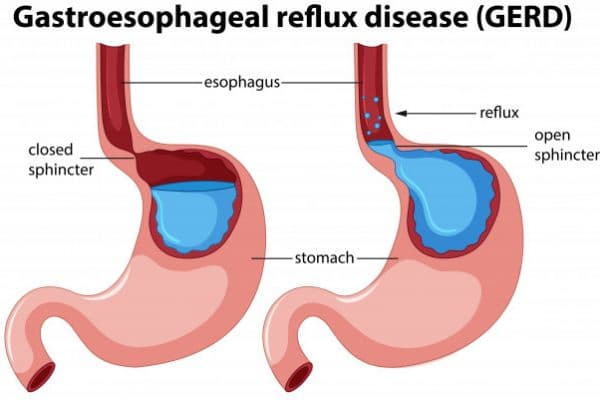
Gastroesophageal reflux disease
Gastroesophageal reflux disease
Gastroesophageal reflux – gastroesophageal reflux disease
It is the flow of stomach acid to the esophagus causing an irritation with the esophagus (endoesophagitis), and many people suffer from frequently gastroesophageal reflux, knowing that the condition can be controlled by changing the lifestyle, but some cases may need stronger medications, or may need surgery to relieve symptoms.
Disease Symptoms
- Burning sensation in the stomach after eating and at night.
- The patient may feel chest pain and difficulty swallowing.
- A common symptom of the disease is regurgitation of food or acid liquid towards the mouth.
- Frequent burping.
- Increased salivation.
- The patient might feel a lump in the throat.
- In the case of nocturnal acid reflux, the patient may suffer from chronic cough, sore throat, in addition to new or worsening asthma, and some sleep disorders.
Disease Causes
- Closing of the sphincter muscle after food and liquid has flowed into the stomach.
- Abnormally relaxation of sphincter muscle or its weakness.
- Frequent acid reflux.
Disease Complications
When neglecting to treat gastroesophageal reflux, the following complications occur:
- Narrowing of the esophagus, which is caused by stomach acid causing scar tissue to narrow the swallowing pathway.
- Esophageal ulcers that can bleed and cause pain, making it more difficult to swallow
- Precancerous changes in the esophagus
Factors to reduce the risk of disease
- Maintain a healthy weight.
- Quit smoking.
- Raise the head of the bed from 6 to 9 inches.
- Avoid lying down after eating for 3 hours at least.
- Chew food slowly and well.
- Avoid fatty or fried foods, tomato sauce, alcohol and caffeine.
- Avoid wearing tight clothes.
Medical care
Medical care for gastroesophageal reflux disease may include herbal remedies to relieve symptoms of gastroesophageal reflux and relaxation therapies to relieve stress and anxiety.
When do you need medical help?
- When the burning sensation is experienced twice or more per week.
- When you feel difficulty to swallow food or fluids.
- When you feel nauseous.
- Constant vomiting.
- When losing weight due to poor appetite.
How is the disease diagnosed?
Gastroesophageal reflux disease is diagnosed based on clinical examination, the date of symptoms to confirm the diagnosis or to detect complications, and it may require some special tests such as upper endoscopy that reveals esophagitis or any other complications, and the esophageal movement testing to measure the systematic muscle contractions in the esophagus when swallowing. And photographing X -ray of the upper part of the digestive system to diagnose the narrowing of the esophagus that may hinder swallowing.
How is the disease treated?
Making lifestyle modifications with taking medications such as antacids, medications that reduce acid production, medications that block acid production and heal the esophagus.
- Medications to strengthen the lower esophageal sphincter.
- Surgery
References:
- Mayo clinic, 7/9/2019, gastroesophageal reflux disease, Electronic Version available at:
- Ministry of Health, Saudi Arabia, 2019, gastroesophageal reflux, Electronic Version available at:
- Medicalnewstoday, translation of Everything You Need To Know About GERD, Electronic Version available at:
Additional References:
- Gastroesophageal Reflux Disease
- Everything You Need To Know About Acid Reflux And GERD




